The epic electoral 'Battle for Bengal' has seen the two bitter rivals BJP and Trinamool Congress change their poll strategies deftly as they square off against each other in a gruelling, one-and-half-month-long campaign.
Jayanta Roy Chowdhury reports on how the West Bengal elections are being fought by the two political adversaries amid COVID challenges, 'Bangaliana', and campaigns based on religion, region, and caste.
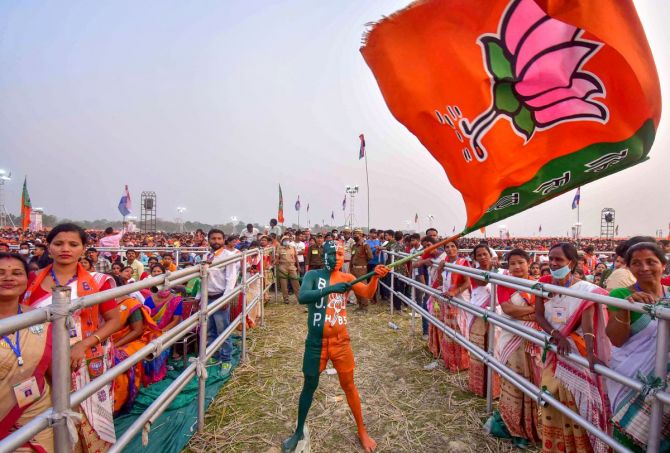
From running a campaign on the 'Bangla nijer meyekei chay' (Bengal wants her daughter) theme and 'Duare Sarkar' (government at your doorsteps) programme, chief minister Mamata Banerjee has, however, changed tracks ahead of the last three phases of polling by attacking Prime Minister Narendra Modi for leaving India unprepared for the second COVID wave.
She has also blamed an influx of "outsiders brought by BJP" for the spread of coronavirus in the state.
The BJP, which had Banerjee on the defensive by campaigning against corruption involving TMC leaders and the 'cut money' (bribery) culture affecting citizens' everyday life, is suddenly trying to defend itself from COVID mismanagement charges.
"Though Banerjee's campaign themes had resonance, BJP's campaign from promising development to attacking her party on graft charges were better modulated. The saffron party also cleverly used the fault lines in Bengal's society to its advantage," said Ranabir Samaddar, a well-known political scientist and Director, Calcutta Research Group.
"However, she seems to have now realised that in a political theatre that lasts one-and-half months, just development and language alone may not sell. Her advisors should have highlighted the COVID issue earlier," Samaddar, earlier the professor-in-charge at Maulana Azad Institute of Asian Studies, Kolkata, said.
Banerjee's 'Bangla nijer meyekei chay' campaign, which stares visitors in the face through huge hoardings leading to the 330-year-old city, seemed to stress 'Bangaliana' or 'Bengaliness' to counter communal politics differentiating between Hindu and Muslim Bengalis.
However, the theme in some ways also articulates the fears of middle-class Bengalis that their numbers, language and culture may be under threat from a fresh influx of migrants.
Though Kolkata has always been a cosmopolitan city, with significant pockets of Hindi, Marwari, Gujarati, Tamil, Malayalam, Urdu and even Chinese speakers, low-key language politics that had arisen in the 1960s and died out by the 1980s, has again come to the fore in recent years with groups
like 'Bangla Pokkho' (On Bengal's side) becoming prominent on social media.
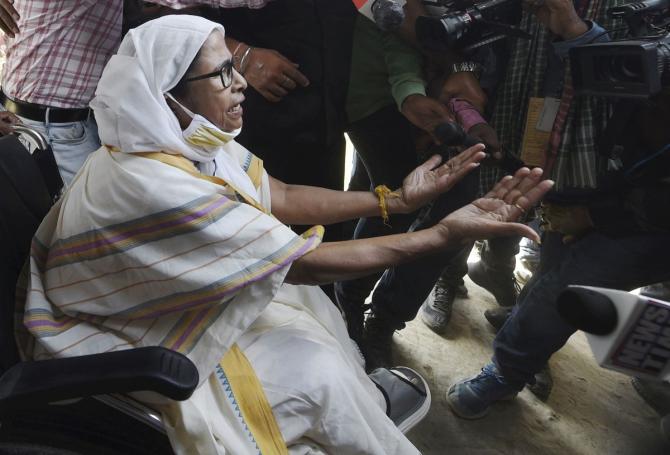
With nearly 10 million Hindi speakers, concentrated in Kolkata and industrial towns in south Bengal, out of West Bengal's population of a little more than 90 million, the campaign risked a possible alienation of a large chunk of voters.
Political analysts feel that the BJP drew its strength from this by asking Banerjee to define 'bohiragoto' (outsiders), a term TMC leaders used repeatedly in their campaign.
West Bengal's ruling party made hair-splitting attempts to define the term as outsiders who had come recently or had been brought in by the BJP for its campaign, as against non-Bengalis residing in the state for generations.
The BJP, however, remained combative on this issue.
"Kolkata has always had a cosmopolitan culture. That is the beauty of West Bengal. All who have come here have fallen in love with the Bengali culture.
"And Bengalis have celebrated this togetherness with people from all parts of India through arts, freedom movement, public life... why come up with such divisions now?" former TMC Union minister Dinesh Trivedi, who recently switched over to the BJP, said.
Samaddar points out that Banerjee could have blunted this political counter-attack and wooed Hindi speakers, mostly hailing from neighbouring Bihar and Jharkhand, by getting RJD leader Tejaswi Yadav and Jharkhand Chief Minister Hemant Soren to join her campaign in a bigger way.
However, others believe that 'Bengal's daughter' remains popular with the poorer Hindi speakers, with pollsters conducting pre and post-poll surveys claiming that the slogan in many 'bustees' (shanty towns) remains "Delhi mein Modi, Bangal mein Didi" (Modi in Delhi and Didi in Bengal).
TMC also brought to the fore a gender divide by highlighting the pro-women sops the West Bengal government has successfully come up with including the UN award-winning 'Kanyashree' programme which transfers cash to girls to continue their studies and prevents early marriages.
Political scientists believe that the TMC's pro-women stance will yield dividends in the ongoing polls.
"A high turnout of women voters which we have been witnessing in many constituencies may help Banerjee who remains extremely popular with women," Samaddar said.
A caste divide which 'Bhadralok' Bengalis rarely acknowledged was also highlighted by the BJP which walked the extra mile to woo Matua, Namasudra and Mahishya voters with promises of sops and reservations.
"We saw the unseemly spectacle of a prime minister wooing voters of a particular community during a visit to a neighbouring country... this was unprecedented in the politics of India as well as West Bengal," former MP and CPI(M) politburo member Nilotpal Basu pointed out.
Since independence, caste-based politics have had little play in West Bengal except in the choice of candidates.
This is seen partly as a result of Bengal's 19th-century renaissance which worked against caste barriers as well as a legacy of the state's curious history of partition.
The "death of caste politics" occurred when Jogendra Nath Mandal, a political leader from Bengal's Scheduled Caste community, resigned as the labour minister in Pakistan's first cabinet and migrated to India in 1950 following repeated riots and atrocities against Namasudras and other Scheduled Castes in East Pakistan.
Mandal, an Ambedkarite earlier influenced by Netaji Subhas Chandra Bose, broke ranks to support the Muslim League in a referendum to decide the fate of Sylhet, a Bengali-speaking district of Assam which eventually went to Pakistan.
He had supported the League believing that the Scheduled Castes would have a better future in Pakistan.
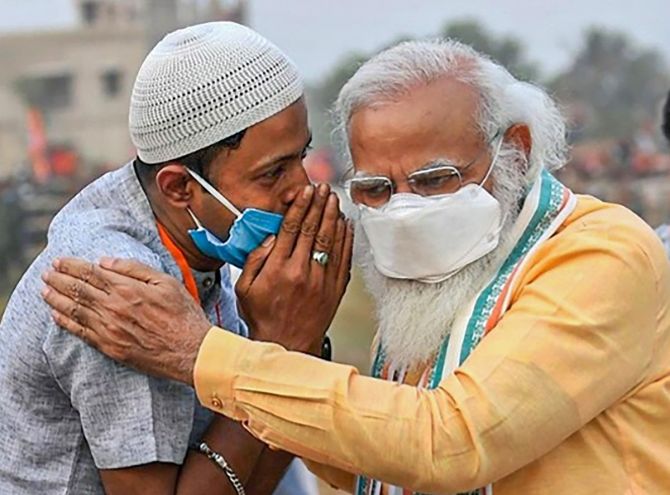
The politics of religion which saw the partition of Bengal in 1947, too figured in different ways in the strategies of rival parties in this assembly election.
While the BJP accused the TMC of "appeasement politics" to woo minority voters, the ruling party in the state charged the BJP with using its 'Jai Shree Ram' slogan to communalise the elections, a charge denied by the saffron party. Trivedi claimed that "the slogan is a protest against corruption".
Banerjee tried to tackle the Hindutva brigade's charges of being overtly pro-minorities by stressing her own Brahmin lineage and reciting 'Chandi Path' (shlokas honouring the mother goddess), while stressing her secular credentials by also reciting from the Koran at the end of her campaign
speeches.
While this may or may not cut ice with the electorate, many fear the fault lines revealed in this election will continue to haunt West Bengal in the years to come.
"We fear the fault lines which both the BJP and the TMC are raking up and deepening will have a long-term implication for our society. This will be a tragedy for a society that is proud of its progressive credentials.
"For us politicians, steering the political discourse away from these divisive fissures will remain a challenge for all future campaigns regardless of who wins or loses," Abhijit Mukherjee, former MP and the chairman of Congress campaign committee for West Bengal, said.

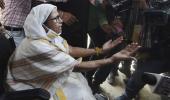








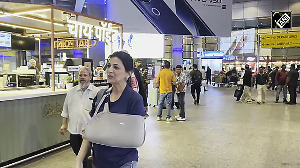
 © 2025
© 2025